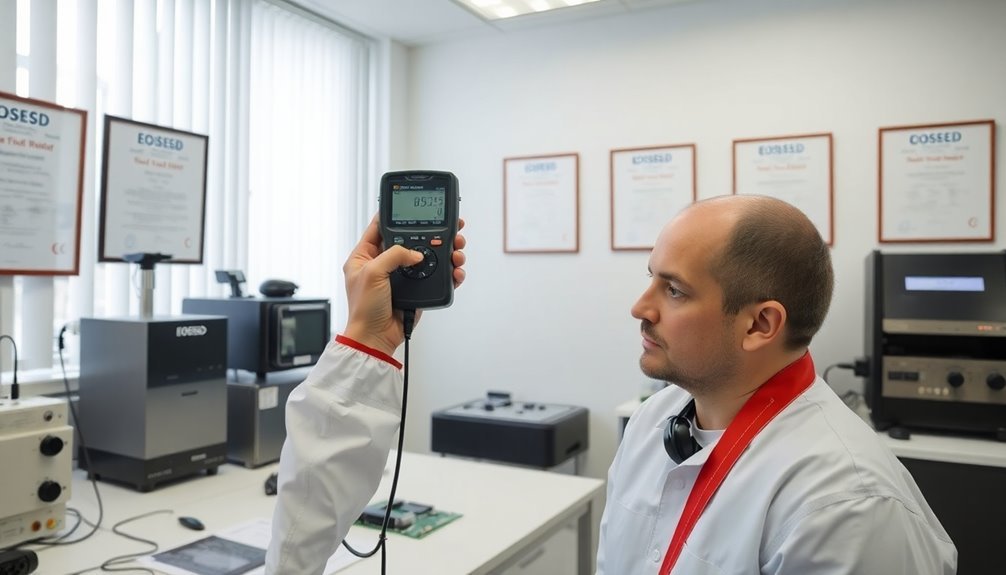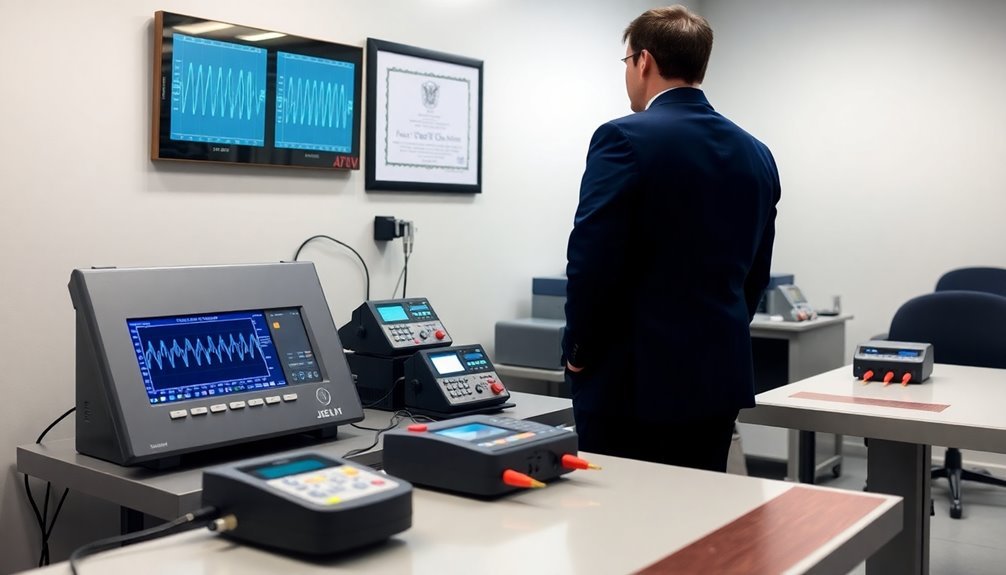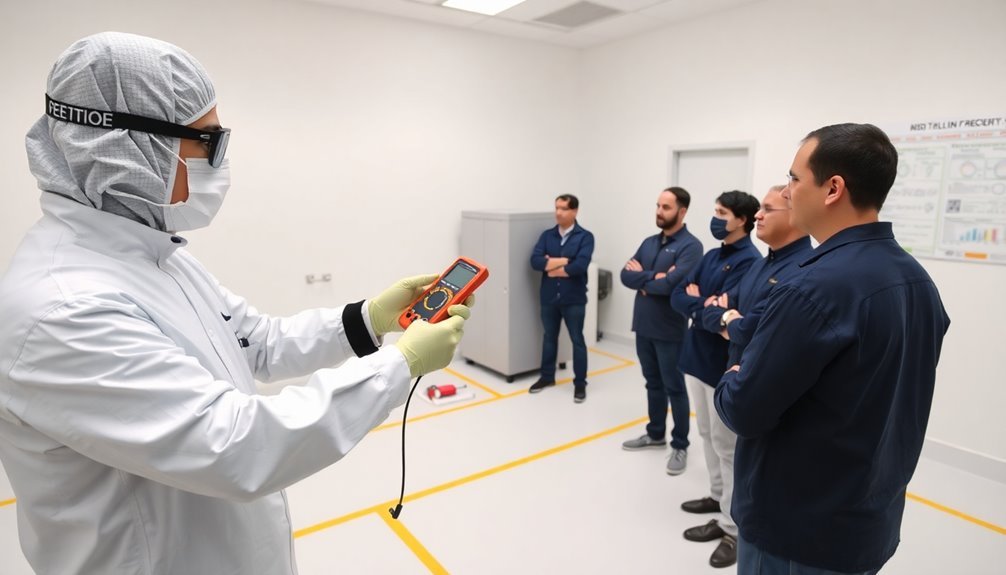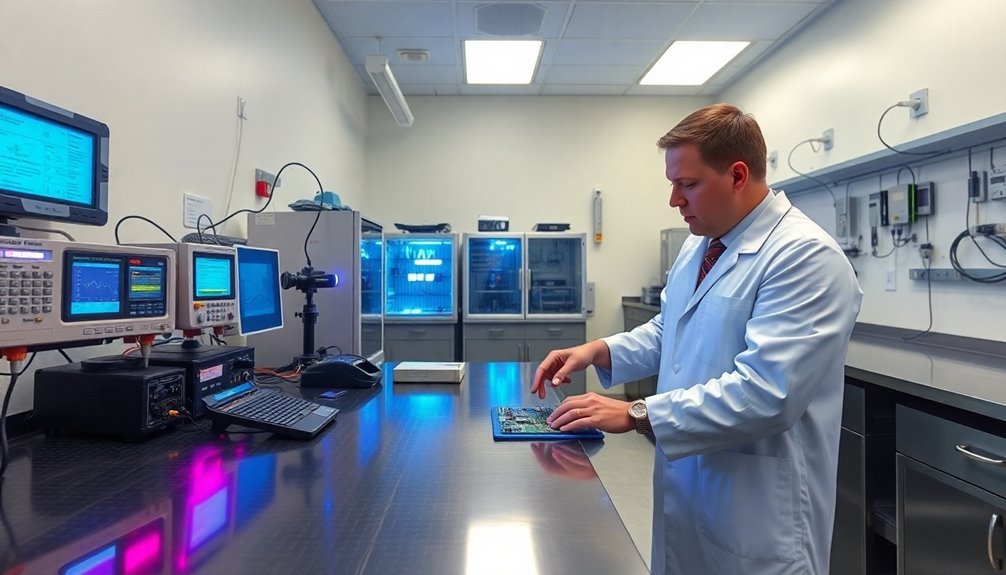You'll find five top-tier training programs to become a certified electrostatic auditor. The EOS/ESD Association Certification Program focuses on ANSI/ESD S20.20-2021 standards, while Prostat TR53 offers hands-on workshops with lifetime certification. JPL's specialized course delivers intensive training with field demonstrations, and the EOS/ESD Operator Certification guarantees compliance through certified trainers. The ESDA Online Academy rounds out your options with flexible learning through live and on-demand courses. Each program offers unique advantages to help you master ESD control and compliance verification, with more extensive benefits waiting to be explored.
EOS/ESD Association Certification Program

With its thorough focus on ANSI/ESD S20.20-2021, the EOS/ESD Association Certification Program equips professionals to become qualified electrostatic discharge control program auditors. You'll learn essential fundamentals of electrical theory, electrostatics, and ESD control program concepts while gaining practical audit skills that integrate with quality management systems.
As a certification candidate, you'll need to review ANSI/ESD S20.20-2021 before starting the course, and you should keep it handy for reference throughout your training. The total cost of getting certified is approximately $2,150 in fees.
The program provides you with extensive resources, including checklists, training slides, and guidance documents to support your learning journey.
Whether you're a quality professional, engineer, consultant, or supply chain specialist, this industry-recognized credential will enhance your ability to meet customer quality requirements. You'll develop expertise in auditing organizations' ESD Control Programs and learn to integrate these audits into broader quality management frameworks.
The program's structured approach guarantees you'll understand both theoretical foundations and practical applications, making you competent in evaluating compliance with ESD control standards.
Through this certification, you'll gain the expertise needed to protect sensitive electronic components and maintain effective ESD control programs.
Prostat TR53 Auditor Training
Prostat's TR53 Certified ESD Auditor Training Program delivers thorough instruction in verifying ESD controls against ANSI/ESD S20.20 standards. You'll receive extensive training through a two-day program, consisting of classroom instruction and hands-on workshops, with an optional certification exam on the third day.
The curriculum covers essential topics including ESD fundamentals, device failure models, and detailed measurement practices. You'll learn to audit worksurfaces, flooring, ionizers, packaging, and personnel grounding equipment using state-of-the-art testing tools. The program emphasizes specialized job disciplines to ensure proper understanding across different educational levels and roles.
The program's instructor, Ron Gibson, brings extensive international expertise in ESD technology to your training experience.
Once you've passed the certification exam, you'll receive a lifetime certification from Advanced Static Control Consulting (ASCC) with no annual fees required. You'll also gain access to free updates on TR53 and ANSI/ESD S20.20 changes starting from 2022.
The certification includes recognition on the Prostat University website and access to ongoing support through phone and email. While the course fee isn't refundable, you can transfer your payment if you're unable to attend the scheduled training.
JPL Control Auditor Course

The JPL ESD Control Auditor course offers specialized training in a compact, focused format. You'll join a small group of just six participants for a four-hour intensive class, followed by a one-on-one field demonstration where you'll prove your proficiency during an actual ESD audit.
To enroll, you'll need prior certification in "Electrostatic Discharge – ESD Control."
The curriculum covers essential areas including ESD control management, documentation procedures, and facilities auditing using the JPL-2731 survey report. You'll learn proper inspection techniques, training program evaluation, and how to handle materials in ESD-controlled environments. The program emphasizes maintaining independence and objectivity throughout the audit process to ensure reliable results.
You'll need to score at least 90% on the certification test and successfully complete your field demonstration to earn your certification, which remains valid for two years. The course runs quarterly for both initial certification and recertification.
This program's particularly valuable if you're a Quality Assurance Engineer, Inspector, or PQA Auditor working at JPL, CalTech, or supplier facilities. It's designed to equip you with the expertise needed for conducting thorough ESD audits in aerospace and related industries where static control is critical.
Electrical Safety Certification Path
Professional recognition in electrical safety begins with two key NFPA certifications: the Certified Electrical Safety Compliance Professional (CESCP) and Certified Electrical Safety Worker (CESW). To qualify, you'll need a high school diploma and 40 hours of electrical safety training as basic requirements. These certifications promote workplace electrical safety and help prevent accidents and injuries.
The path becomes more specialized based on your background, with distinct requirements for electricians, electrical engineers, and other professionals.
For CESW certification specifically, you'll need 250 hours of related instruction and 12,000 hours of verified work experience with electrical power systems. The certification process involves a 3-hour computer-based exam with 110 multiple-choice questions based on NFPA 70E standards.
Key aspects of maintaining your certification include:
- Completing recertification every 3 years
- Earning 50 points through professional development activities
- Documenting all electrical safety-related training
- Submitting points during your recertification cycle
Your certification remains valid for three years from your exam date. To maintain active status, you'll need to meet ongoing professional development requirements through various electrical safety-related activities and submit documentation within your recertification period.
Industry-Specific ESD Training Options

Several industry-leading providers offer specialized ESD training options tailored to your organization's needs. You'll find extensive programs from providers like ESD TECHCON and EOS/ESD Association, offering instruction in ESD standards, physical properties of electrostatics, and protection measures. The ESDA Online Academy delivers both live and on-demand courses, while Mastery Technologies provides video-based training focused on grounding and handling techniques. Training programs are continuously updated to incorporate latest ESD technology advances.
| Provider | Key Features | Delivery Method |
|---|---|---|
| ESD TECHCON | INARTE certified, customizable | Interactive, in-person |
| ESDA Online Academy | Tiered pricing, device design focus | Live & on-demand |
| Mastery Technologies | Handling techniques, packaging | Video-on-demand |
| EOS/ESD Association | Operator training, specialized modules | Mixed format |
| Custom Solutions | Compliance verification, auditing | Hybrid approach |
You'll need to choose a program that aligns with your specific certification goals. Most programs cover ANSI/ESD S20.20 and IEC 61340-5-1 standards, ensuring you're trained according to international requirements. Consider programs offering practical components like workstation grounding, personal grounding, and ESD protected area protocols to build extensive auditing skills.
Frequently Asked Questions
What Salary Increase Can I Expect After Becoming a Certified ESD Auditor?
You can expect a salary increase of around $12,000 annually after ESD certification. While specific ranges vary by industry, you'll likely earn between $87,000 and $151,000, similar to other technical auditor roles.
Can ESD Auditor Certifications Be Transferred Between Different Countries?
Yes, you'll find that most ESD auditor certifications can transfer between countries, especially if they're from recognized bodies like SGS or EOS/ESD Association. However, you may need additional documentation for some regions.
Are There Online-Only Options Available for ESD Auditor Training Programs?
Yes, you can complete the ESD Program Associate Certification entirely online through EOS/ESD Association. It'll cost you $1,950 and includes three online classes plus an assessment test, with annual renewal required.
How Physically Demanding Is the Daily Work of an ESD Auditor?
You'll face moderate physical demands as an ESD auditor. You'll spend hours standing, walking through facilities, carrying test equipment, and performing tasks that require bending and reaching in various workplace environments.
Which Industries Have the Highest Demand for Certified ESD Auditors?
You'll find the highest demand for ESD auditors in electronics manufacturing, semiconductor fabrication, automotive electronics, medical devices, and aerospace industries. These sectors rely heavily on protecting sensitive electronic components from static damage.
In Summary
You'll find these five training programs provide thorough preparation for your career as an electrostatic auditor. Whether you're pursuing the renowned EOS/ESD certification or specialized industry training, each option offers unique advantages. Don't hesitate to evaluate your specific needs and career goals when selecting a program. The field of electrostatic auditing demands well-trained professionals, and these programs will help you meet those standards.





Leave a Reply